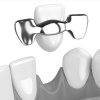What are Impacted Teeth?
Impacted teeth are blocked when they attempt to break through the gums in your mouth. Wisdom teeth are often impacted and usually begin to erupt between the ages of 17 and 21. Your Springfield dentist refers to these teeth as third molars. They tend to become impacted because there is not enough room in the mouth for them.
An impacted tooth can often have no symptoms, however, when it does try to break through the gumline the top of it may become infected and swollen. You can also experience pain in the adjoining teeth or in the ear on that side of the jaw.
If left untreated, an impacted tooth can cause an infection called pericoronitis. This can spread to the throat and into the neck. Severe cases can cause a hospital stay or surgery.
Even though they are beneath the gums, an impacted tooth can also get cavities. They can also push in on neighboring teeth leading to tooth movement, decay or gum disease. They can also change the way your teeth come together when bite, chew or speak.
What are the Symptoms of Impacted Teeth?
Signs of this condition include:
- Swelling of the gum in the back of your mouth
- Difficulty opening your jaw
- Bad breath
- A bad taste in the mouth
- Pain when you open your mouth
- Pain when chewing or biting
- Pain can occur for several days and then vanish. It can return weeks or months later
How are Impacted Teeth Treated?
Your Springfield dentist can find this condition through dental x-rays. Since it is impossible to prevent an impaction, there is nothing that can be done to avoid it. The only thing that helps is to have the tooth removed, which normally requires the services of an oral surgeon.



